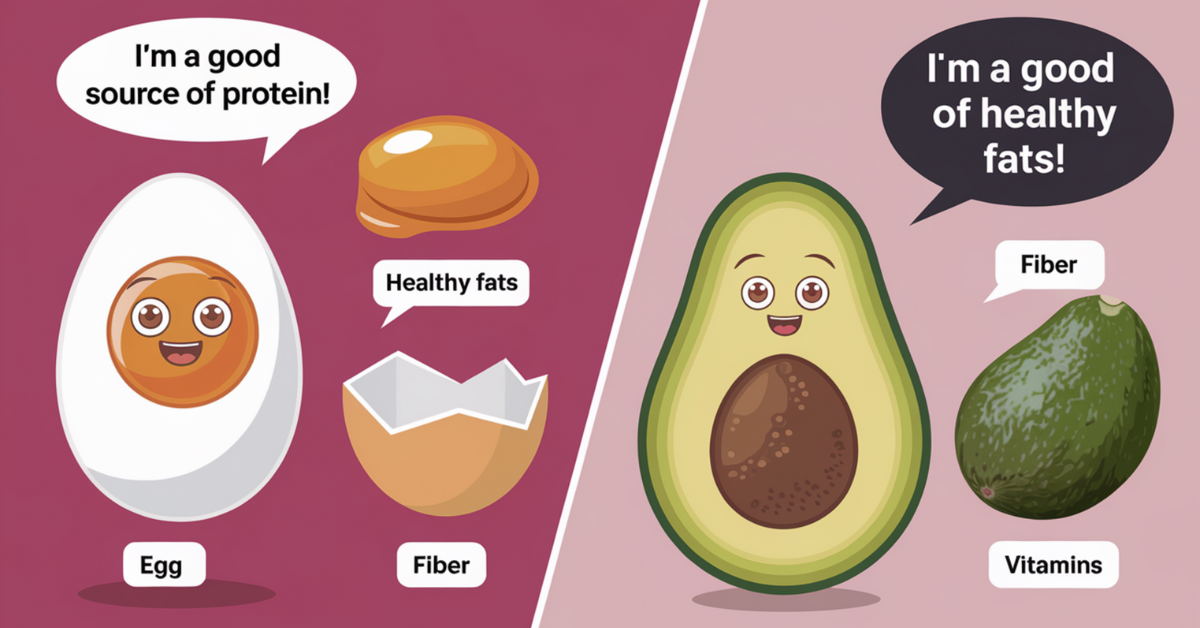Table of contents
Introduction
Many people wonder, Is it okay to eat eggs and avocados every day? This question has sparked debates among nutritionists and health enthusiasts.
Eggs and avocados are two of the most popular staples in modern diets. From breakfast plates to gourmet recipes, these foods are celebrated for their versatility and health benefits. But is it okay to eat them every day? This question is more relevant than ever as people become increasingly health-conscious, seeking nutrient-rich foods that support their well-being.
In this article, we’ll dive deep into the nutritional value of eggs and avocados, explore their health benefits and potential risks, and address common misconceptions. By the end, you’ll have a clear understanding of whether incorporating these foods daily aligns with your health goals.

Why does this question matter? Despite their superfood status, both eggs and avocados come with polarizing opinions. Some health enthusiasts praise them for their nutrient density, while others warn of potential drawbacks like cholesterol levels or calorie density. This article will cut through the noise, offering evidence-based insights to help you make informed dietary choices.
We’ll cover everything from the nutritional profiles of eggs and avocados to their benefits for heart, brain, and skin health. Additionally, we’ll examine common concerns, such as allergies, cholesterol myths, and the environmental impact of avocado farming. Practical advice on portion control, recipes, and expert recommendations will also be included.
Whether you’re an avocado toast lover, an egg aficionado, or simply curious about their effects on your health, this guide has you covered.
Nutritional Overview of Eggs and Avocados
Key Nutrients in Eggs
Eggs are a powerhouse of essential nutrients. They are an excellent source of high-quality protein, providing all nine essential amino acids needed for muscle growth and repair. Additionally, eggs are rich in vitamins like B12, which supports energy production, and vitamin D, which promotes bone health. Minerals such as selenium and phosphorus further contribute to overall well-being. The yolk contains healthy fats and antioxidants like lutein and zeaxanthin, essential for eye health.
Key Nutrients in Avocados
Avocados are celebrated for their rich content of heart-healthy monounsaturated fats. These fats help lower bad cholesterol and improve cardiovascular health. They also provide dietary fiber, supporting digestion and gut health. Avocados are packed with vitamins such as E, C, and K, along with potassium, which helps regulate blood pressure. Their antioxidants contribute to skin health and fight inflammation.
Comparing Nutritional Profiles
Eggs and avocados complement each other beautifully in a diet. While eggs are high in protein, avocados provide the healthy fats needed for sustained energy. Together, they create a balanced meal rich in essential nutrients. Incorporating both can support muscle development, heart health, and cognitive function.

Health Benefits of Eating Eggs Daily
Let’s explore the benefits, risks, and science-backed insights to determine if it’s okay to eat eggs and avocados every day
Muscle and Bone Health
Eggs are one of the richest sources of complete protein, containing all the essential amino acids required for muscle repair and growth. This makes them a go-to choice for athletes and fitness enthusiasts. Additionally, eggs are a natural source of vitamin D, which works alongside calcium to strengthen bones and prevent conditions like osteoporosis. Consuming eggs regularly can support an active lifestyle while ensuring bone density remains optimal.
Boosting Brain Function
Choline, a nutrient found in egg yolks, is essential for brain health. It plays a vital role in producing acetylcholine, a neurotransmitter that regulates memory and mood. Studies suggest that adequate choline intake may improve cognitive performance and reduce the risk of neurodegenerative diseases. Including eggs in your diet can be a smart move for maintaining mental clarity and focus.
Supporting Eye Health
Egg yolks contain lutein and zeaxanthin, two powerful antioxidants known to protect against age-related macular degeneration (AMD) and cataracts. These nutrients help maintain sharp vision and protect the eyes from harmful UV rays and blue light. For anyone spending extended hours on screens, eggs can be a simple yet effective addition to safeguard eye health.
Health Benefits of Eating Avocados Daily
Cardiovascular Benefits
Avocados are a heart-health powerhouse, thanks to their high levels of monounsaturated fats, particularly oleic acid. These healthy fats help reduce LDL (bad) cholesterol levels while boosting HDL (good) cholesterol, improving overall cardiovascular health. Additionally, avocados are rich in potassium, an essential mineral that regulates blood pressure and reduces the risk of hypertension. Their anti-inflammatory properties also protect blood vessels, ensuring a healthier circulatory system.

Digestive Health
With about 10 grams of fiber in a single avocado, this fruit is a natural ally for gut health. Soluble fiber feeds the beneficial bacteria in the gut, promoting a balanced microbiome, while insoluble fiber ensures smoother digestion and prevents constipation. Regularly consuming avocados can reduce bloating and improve overall digestive efficiency, contributing to better nutrient absorption.
Skin and Hair Nourishment
Avocados are loaded with antioxidants like vitamin E and vitamin C, which combat free radicals and reduce signs of aging, such as wrinkles and fine lines. The healthy fats in avocados also provide deep hydration to skin and hair, making them glow from within. They’re a natural source of biotin, essential for stronger, shinier hair and healthier nails. Including avocados in your diet or skincare routine can work wonders for your overall appearance.

Supporting Weight Management
Despite their caloric density, avocados can aid in weight management. Their combination of healthy fats and fiber promotes satiety, reducing the urge for unhealthy snacking. They’re also low in carbs, making them ideal for those on ketogenic or low-carb diets.
Are There Risks of Consuming Eggs Daily?
When deciding if it’s okay to eat eggs and avocados every day, it’s important to consider their nutritional value.
Cholesterol Concerns
For years, eggs were considered a culprit in raising cholesterol levels. However, modern research shows that dietary cholesterol has a minimal impact on blood cholesterol for most individuals. Eggs are a rich source of cholesterol, with about 186 mg per yolk, but they also contain nutrients like choline and omega-3 fatty acids, which promote heart health. The effect of eggs on cholesterol levels varies between individuals, with some experiencing a slight increase in LDL cholesterol. Those with pre-existing conditions like hypercholesterolemia may need to limit their intake to avoid potential risks.
Allergies and Intolerances
Egg allergies, although uncommon in adults, are a significant concern for children. Symptoms can range from mild (hives and nasal congestion) to severe (anaphylaxis). Egg intolerance, on the other hand, may cause digestive discomfort without triggering an immune response. For those with sensitivities, alternatives like flaxseed or chia seeds can serve as substitutes in recipes.
Portion Control
Overconsumption of eggs can lead to excessive calorie intake, particularly if paired with high-fat cooking methods like frying. Experts recommend sticking to 1–2 eggs per day for most individuals to maintain a balanced diet. Monitoring portion sizes ensures you reap the benefits of eggs without overloading on cholesterol or calories.
Are There Risks of Consuming Avocados Daily?
Experts often recommend moderation when asking, Is it okay to eat eggs and avocados every day?
Caloric Density
Avocados are calorie-dense, with approximately 240 calories in a single fruit. While they provide healthy fats, excessive consumption can lead to unintentional weight gain. Balancing avocado intake with other nutrient-rich, low-calorie foods is key to maintaining a healthy weight.
Allergies and Sensitivities
Though rare, avocado allergies can occur, particularly in individuals with latex allergies. Symptoms may include stomach pain, itching, or swelling of the lips and mouth. If you suspect an avocado allergy, consult a healthcare provider and explore alternatives like olive oil or nuts for healthy fat sources.
Sustainability Concerns
Avocado farming has a significant environmental footprint, consuming large amounts of water and contributing to deforestation in producing regions. Choosing sustainably sourced avocados or limiting consumption can help reduce the environmental impact. Look for certifications like Fair Trade or Rainforest Alliance when purchasing.

Economic Considerations
Avocados are among the more expensive fruits, which can be a concern for budget-conscious consumers. Opting for seasonal produce or exploring alternative healthy fats like nuts and seeds can help diversify your diet without breaking the bank.
Health Considerations
Heart Health: The monounsaturated fats in avocados can help reduce bad cholesterol levels, potentially lowering heart disease risk. While eggs contain cholesterol, moderate consumption (up to one egg per day) is generally considered safe for most people.
Weight Management: Both foods are calorie-dense. Incorporating them into meals like avocado toast with egg and apples can be part of a balanced diet, but portion control is essential to avoid excessive calorie intake.
Nutrient Absorption: The healthy fats in avocados aid in the absorption of fat-soluble vitamins (A, D, E, K) present in eggs and other foods, enhancing overall nutrient intake.
Recommendations
- Variety: Incorporate a diverse range of foods to ensure a comprehensive nutrient intake.
- Portion Control: Be mindful of serving sizes to manage calorie consumption effectively.
- Preparation Methods: Opt for cooking methods like poaching or boiling eggs and using whole-grain bread for avocado toast to maximize health benefits.
For more insights on the health aspects of combining these foods, consider reading Are Egg and Avocado on Toast Healthy?.
FAQs
Can Eating Eggs and Avocados Daily Cause Weight Gain?
Weight gain depends on overall calorie consumption, not individual foods. Eggs are low in calories (around 70 per egg), while avocados are more calorie-dense (approximately 240 per fruit). Eating these foods in moderation as part of a balanced diet is unlikely to lead to weight gain. Combining eggs and avocados in meals can promote satiety due to their protein, fat, and fiber content, potentially helping with weight management rather than contributing to weight gain.
Are Eggs and Avocados Suitable for Children and Seniors?
Yes, eggs and avocados are excellent choices for children and seniors due to their nutrient density. Eggs provide high-quality protein, essential for growth in children and muscle maintenance in seniors. The choline in eggs also supports brain development in young children and cognitive health in older adults. Avocados, rich in healthy fats, aid in brain function and support heart health across all ages. However, portion sizes should be adjusted according to individual nutritional needs and caloric requirements.
How Can Vegans Replace Eggs in Their Diet?
Vegans can replace eggs with plant-based alternatives like flaxseed or chia seed gels (1 tablespoon of seeds mixed with 3 tablespoons of water equals one egg) in recipes. Tofu is another popular substitute, particularly for scrambles. Nutritional yeast adds a savory, egg-like flavor to vegan dishes. For avocados, no replacement is typically needed as they are already plant-based and a staple in vegan diets.
Final Verdict
Eggs and avocados are nutrient-dense foods that can be part of a healthy diet when consumed in moderation. The key is balance and variety. Daily consumption of these foods can provide numerous health benefits, from improved heart health to better brain function and glowing skin. However, be mindful of portion sizes to avoid excessive calorie intake and consider individual health needs, such as cholesterol sensitivity or food allergies.
For most people, including 1–2 eggs and half to one avocado daily is a safe and effective way to enjoy their benefits. Pair these with whole grains, vegetables, and lean proteins for a well-rounded diet. As always, consult with a nutritionist or healthcare provider for personalized advice.
Conclusion
Eating eggs and avocados daily is a great choice for overall health, provided you practice moderation and listen to your body’s unique needs. Incorporate these nutrient-rich foods wisely into your meals, and enjoy the health benefits they bring!
Ultimately, is it okay to eat eggs and avocados every day? For most people, the answer lies in mindful consumption and portion control.

